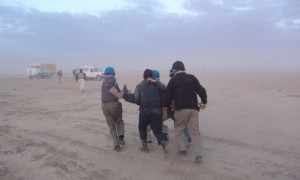THE GUARDIAN
Iraqi forces storm Camp Ashraf, home to 3,500 Iranian exiles, as supporters call on US and UN to intervene

Iraqi forces have stormed a camp of Iranian dissidents in north-eastern Iraq amid warnings that the US government may have broken international law by failing to protect the camp.
An Iraqi general, Ali Ghaidan, confirmed that an operation took place in the early morning at Camp Ashraf, home to 3,500 Iranian exiles, all members of the Mojahedin-e-Khalq (MEK) militia. He said no one was killed, but representatives of the group in London said 23 people died including six women.
A hospital official in Baquba, capital of the Diyala province, reported three deaths and 13 wounded. The figures could not be confirmed as access to the camp, whose residents have “protected persons” status under the Geneva convention, is restricted.
Ghaidan said troops were responding to exiles who had been throwing stones and throwing themselves in front of soldiers’ trucks over the past several days. The group’s supporters in London, who had been warning of an attack, said Iraqi forces used metal bars, sticks and batons to beat the residents and opened fire on the camp. The supporters called for urgent UN and US intervention.
“This is a massacre, a catastrophe,” said Behzad Saffari, who has lived at Ashraf for nine years and acts as the camp’s legal adviser. “They came inside the camp and attacked people with grenades and teargas, and then they started to shoot people. When people saw the attack was about to begin, they lined up to defend their homes.”
The raid was the latest in a series of interventions at the camp since jurisdiction was passed from the US to the Iraqi government in 2009. A WikiLeaks cable identified by the Bureau of Investigative Journalism at City University in London shows the US was aware the Iraqi government planned to crack down on the MEK, with potentially grave humanitarian consequences.
“If the government of Iraq acts harshly against the MEK and provokes a reaction,” warned the US deputy chief of mission in Iraq, Patricia Butenis, in a cable in March 2009, “the USG faces a challenging dilemma: we either protect members of a foreign terrorist organisation against actions of the Iraqi security forces and risk violating the US-Iraq security agreement, or we decline to protect the MEK in the face of a humanitarian crisis, thus leading to international condemnation of both the US government and the government of Iraq.”
Phil Shiner of the UK law firm Public Interest Lawyers, which represents some Ashraf residents, said: “I have not seen these cables. However, from what I can gather their content is quite astonishing and shows that the US – and by implication the UK – knew Iraqis were treating residents inhumanely, foresaw the possibility of serious injuries in clashes at the camp, and knew what was happening at the time of the deaths but did absolutely nothing.”
International law requires other states to take positive action to protect innocent civilians in these circumstances, he added.
The US defence secretary, Robert Gates, who is visiting US troops in northern Iraq, said US forces were maintaining a “nearby presence” but did not give details, although he said the military was providing some medical assistance.
“I urge the Iraqi government to show restraint and live up to their commitments to treat Ashraf residents in accordance with Iraqi law and international obligations,” Gates told reporters travelling with him in Mosul, 225 miles north-west of Baghdad.
Most camp residents have been at Ashraf since they were given refuge by the former Iraqi dictator, Saddam Hussein, during his decade-long war with Iran. They have vowed to fight plans to relocate them in Europe, or the Iraqi Kurdish north, claiming they would be targeted by Iranian agents. The Iranian government has long sought closure of the camp in Diyala province, 50 miles north of Baghdad.
The Iraqi government views the MEK, the militant wing of the Paris-based National Council of Resistance of Iran, as a cult that demands total devotion from its members and forcibly separates families. The MEK launched a series of suicide bombings and guerrilla attacks against Iranian targets after the 1979 Islamic revolution and throughout the war with Iran. It has not launched a militant attack since 2001 and the EU and Britain have removed the group from their terror lists, but it remains on the US state department list of foreign terrorist organisations.
The fate of the 3,500 rebels is a key bilateral issue with Iran. Eleven residents were killed when Iraqi forces raided the base in 2009 and pledged to evict the camp’s residents.
The group has been winning growing international support. At a conference at the House of Lords this week, American and British public figures criticised the Obama administration for “turning a blind eye” to attacks by Iraq on the camp and urged the state department to remove the group from its terrorist list.
“Ashraf is part of a government-in-exile which is headed by Madame Maryam Rajavi. We should recognise the government-in-exile headed by Madame Rajavi,” said Howard Dean, the former Democratic presidential candidate. “It is an outrage that the MEK remains on the terrorist list in the US. There is no legitimacy in this.”
Lord Corbett of Castle Vale, chairman of the British parliamentary committee for Iran freedom, said: “It is now urgently imperative that the UN acts to stop what is heading for an organised humanitarian outrage at Camp Ashraf. There have been repeated attacks, injuries and deaths inflicted by Iraqi security forces and Iranian agents against the defenceless residents.”